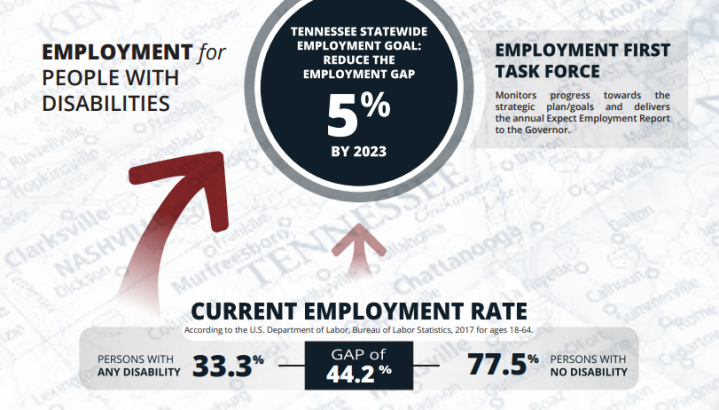Employment First and the Council
In the 1980s, the Council began investing in what is now a nationally recognized movement known as “Employment First.” This relates to a core value of the Council’s, rooted in the Developmental Disabilities Act: people with disabilities have valuable contributions to make, including in the labor force. Read more about the Council’s legacy establishing Employment First in Tennessee on our “Impact Over Time” page.
Read below about just a few ways the Council continues to work for long-term, positive change for employment rates for people with disabilities.
State Agency Collaboration: The Employment Roundtable
One of the main roles of the Council is working across state agencies to link programs and services that support people with developmental disabilities. In the area of employment, linking programs is very important, as many different state departments offer employment services for people with disabilities.
Since 2004, the Council has gathered a group of representatives from state departments to help coordinate employment services. Two fundamental goals guide the group:
- Doing a better job of supporting people with their employment goals, especially as they move through a complex service system; and
- Increasing employment outcomes among people with developmental disabilities across Tennessee.
The Roundtable has steadily grown to more than 20 people that represent many state departments (listed below), plus two of the Council’s Developmental Disabilities Network partners.
The group calls itself the “Employment Roundtable” because the meetings are conversational, round-robin style updates for shared learning and a safe space to air issues and questions. The group also talks about “case studies” to problem-solve real life situations together. Attendance rates stay around 90 percent, showing the value agencies place on the opportunity. The group focuses on improving supports for youth with disabilities in high school who are entering adulthood. See this document (a "Memorandum of Understanding" or M.O.U.) that explains what key state agencies offer in Tennessee. This is MOU is the first of its kind in the country to show exactly how different agencies supporting youth with disabilities to find employment should be working together.
The Roundtable helps us all better understand systemic issues that no one agency can solve alone. With the goal of coordinating and making the entire service system work better, nothing compares to sitting around the same table.
Roundtable members
- Council on Developmental Disabilities
- Department of Children’s Services
- Department of Education
- Department of Health
- Department of Human Resources
- Department of Human Services
- Department of Intellectual and Developmental Disabilities
- Department of Labor
- Department of Mental Health and Substance Abuse Services
- Division of TennCare
- Department of Transportation
- Department of Treasury
- (DD Network partners) Disability Rights Tennessee
- (DD Network partners) Vanderbilt Kennedy Center
Key Partnerships: TN Employment First Task Force and TennesseeWorks
The Council plays a leadership role in two statewide groups working to improve employment rates among Tennesseans with disabilities. Visit the links below for the Employment First Task Force and the TennesseeWorks Partnership to find more information, recent reports, employment data, and real stories of Tennesseans with disabilities working across the state:

Inclusive Higher Education
In 2010, we funded our state’s first inclusive higher education program, Next Steps at Vanderbilt. Next Steps is now a nationally recognized program for students with intellectual disabilities.
Over the next six years, the Council led efforts to fund inclusive higher education programs in Tennessee. Today, Tennessee has 6 programs serving students with intellectual disabilities:
- TigerLIFE at the University of Memphis
- IDEAL at Lipscomb University (Nashville)
- EDGE at Union University (Jackson)
- FUTURE at the University of Tennessee (Knoxville)
- Access ETSU at East Tennessee State University (Johnson City)
The Council continues to be an active member of the statewide Inclusive Higher Education Alliance where organizations gather to support and promote these programs across the state. Data from the Alliance proves that graduates of these programs have much higher rates of employment and independence than students who do not attend a college program.
In 2021-22, our partners at the TN Department of Intellectual and Developmental Disabilities launched their Tennessee Believes program to offer new funding to increase the number of inclusive higher education programs that serve students with intellectual and developmental disabilities. Read about this program on DIDD website here.
In 2022, DIDD's TN Believes program awarded grants to Tennessee State University and Dyersburg State Community College to launch new inclusive higher education programs on their campuses. (Read in our Feb. 2022 e-news how our Council member Brigham Scallion helped lead the effort to create the first community college inclusive higher education program in TN at Dyersburg State). TN Believes is also supporting Next Steps at Vanderbilt and the FUTURE program at UT Knoxville to expand their programs.
The Council is proud to continue the work to grow inclusive higher education in our state. The future for Tennessee students with disabilities has never been brighter.
Watch the video below, which we created in 2019, to learn more about TN's inclusive higher education programs.
Moving the Needle
Real change doesn’t happen with one program or agency. It requires focused, sustained work involving every related agency, organization, and group of stakeholders. The Council on Developmental Disabilities’ unique role in building that collaboration is moving the needle on employment for people with disabilities in Tennessee.
Explore these stories to learn more about the real impact of our work to improve employment rates for Tennesseans with disabilities over the years.
- Breaking Ground 107 - Transformation at Every Level: Change Comes to VR
- Breaking Ground 106 - Where are they now? The first Next Steps at Vanderbilt class, 10 years later
- New Video: Bryshawn's Story (Getting Help through the Employment and Community First CHOICES Program for Tennesseans with Disabilities)
- Project SEARCH at VUMC Celebrates 100 Hires
- New Video Lydia's Story: Person-centered support in action
This Page Last Updated: May 15, 2024 at 12:58 PM